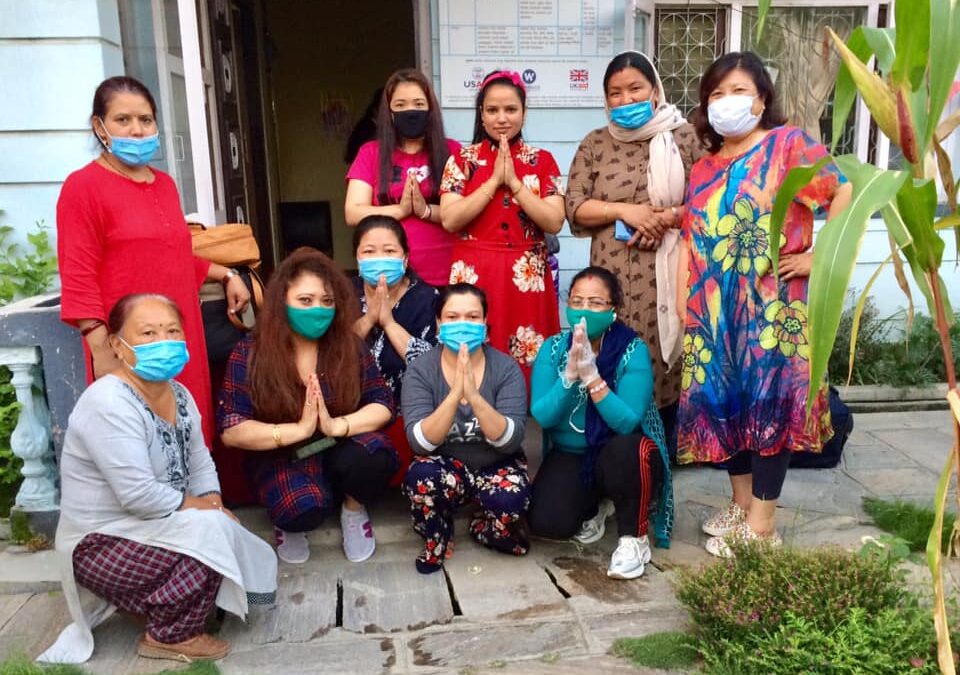
RIGHTS ADVOCATES BUILD SOUTHEAST ASIA CAMPAIGN AGAINST WAGE THEFT
On this year’s July 30 World Day Against Trafficking in Persons, a coalition of rights organizations including the Solidarity Center are highlighting widespread wage theft perpetrated against Southeast Asia’s migrant workers. Although this form of labor exploitation has been thrown into stark relief during the COVID-19 pandemic, it is a long-standing problem in the region.
“Wage theft is a crime against humanity. If the global pandemic can be overcome, why not wage theft?” says Plantation Rural Education and Development Organization (PREDO) Sri Lanka Executive Director Michael Joachim.
The Justice for Wage Theft campaign is demanding governments address wage theft perpetrated against millions of migrant workers in the wake of the pandemic—including those who voluntarily returned home or were forcibly repatriated, often after employers unilaterally severed their contracts and stopped paying them their earned wages. Many such returnees now find themselves trapped in debt bondage to labor recruiters to whom they owe money on interrupted contracts and, sometimes, for emergency air fare, putting them at risk of labor exploitation. Debt bondage is one of the most prevalent forms of forced labor worldwide.
“The campaign is asking that indebted returnees be protected from exploitation and that migrant workers who returned home in fear for their lives receive their earned wages for work they completed,” says regional migrant rights expert and Solidarity Center Senior Program Officer Miyuru Guansinghe.
The Justice for Wage Theft’s website highlights coalition members’ work and provides a mechanism for collecting wage theft cases and signatures on a public petition for a just compensation mechanism. Coalition members are ASEAN Services Employees Trade Union Council (ASETUC), Cross-Regional Center for Refugees and Migrants (CCRM), Lawyers Beyond Borders, Migrant Forum in Asia (MFA), South Asian Regional Trade Union Council (SARTUC) and the Solidarity Center.
In two reports covering the period December 2019 through June 2021, the campaign documented more than 1,800 wage theft cases perpetrated against people migrating from Bangladesh, India, Indonesia, Nepal, Pakistan and the Philippines to work in agricultural, domestic, construction and other sectors in Bahrain, China, Kuwait, Lebanon, Malaysia, Maldives, Oman, Philippines, Qatar, Saudi Arabia, Sri Lanka and the United Arab Emirates. Volumes 1 and 2 of “Crying Out for Justice: Wage Theft against Migrant Workers” include hundreds of cases identified by the Solidarity Center during direct interviews with affected workers in five Sri Lankan districts.
Wage theft is an indicator of forced labor under International Labor Organization (ILO) standards, says MFA. Under ILO standards, states must develop wage-theft-eradication measures and effective justice mechanisms. Workers are also entitled to effective remedies—including prosecution of employers under criminal law, and payment of earned wages and other compensation, and governments must ensure workers’ wages are paid regularly and a final settlement of all wages is effected upon termination of an employment contract.
Forced labor is the most common result of human trafficking, with an estimated 25 million people trapped in often slave-like conditions. A United Nations report last year found that the percentage of trafficking victims exploited for forced labor is increasing over time and that surveyed countries reported a threefold increase in the number of trafficking victims from 2003 through 2018. Forced labor generates up to $150 billion a year in illegal profits for traffickers—including $51.2 billion made illegally from forced labor exploitation in domestic work, agriculture, forestry, fishing, construction, manufacturing, mining, utilities and other industries, says the International Labor Organization (ILO).
“Human trafficking is a violation that should have no place in civilized society, ” says Saviya Development Foundation Training and Program Director Thushara Senanayaka.
The Justice for Wage Theft campaign is an offshoot of MFA’s regional network of nongovernmental organizations, associations and trade unions of migrant workers, and individual advocates in Asia who are working to protect migrant worker rights and welfare. Such initiatives include efforts in coalition across the globe to improve COVID-19 vaccination access for migrant workers and their family members.
You can support the Justice for Wage Theft campaign by completing its online petition, “Say Yes to Justice!”

Countries Must Cooperate to Facilitate Safe Migration for Workers
Globally, marginalized workers have been especially hard hit by the novel coronavirus. Migrant workers in particular have experienced some of the harshest effects of COVID-19 and the related lockdowns, quarantines and travel restrictions.
Yet while the world has recognized “the bravery of frontline workers,” many of whom are migrants, “we must now turn that celebration into something that is meaningful and not just ephemeral,” says United Nations Secretary-General António Guterres.
We must ensure “fair and ethical recruitment, decent work, and access to health care and social protection without discrimination. It is also critical we promote financial inclusion of migrants and their families. We must address discrimination … migrants must not be stigmatized or denied access to medical treatment and other public services.”
Guterres spoke during release of the first UN Secretary General’s report on the Global Compact for Safe, Orderly and Regular Migration. Adopted in December 2018, the Global Compact sets out a cooperative framework for achieving safe, orderly and regular migration within a rights-based framework, and includes a process for implementation and review.
The report, part of the UN review process, focuses extensively on the effects of COVID-19 on the world’s 272 million migrants and the guidance the Global Compact offers in addressing the adverse effects on migrant workers.
Fewer Protections for Migrant Workers Under COVID-19
As borders and worksites were shut early this year, millions of migrant workers were stranded around the world, many trapped in crowded housing with no access to support, including access to food and other life-sustaining provisions. Many migrant workers were systematically denied social safety net protections like unemployment benefits or other forms of income support.
Others were forced to work in unsafe conditions, suffered from wage theft, and retaliation for speaking out about abuse. Origin countries frequently lack adequate health infrastructure, exposing those who returned to a greater risk of contracting COVID-19, or making it difficult for those who were infected to find care. Migrants returning in these conditions are also particularly vulnerable to exploitation, violence, stigma, discrimination and, without jobs, may be unable to support themselves or their families.
Although some governments took positive steps to voluntarily return migrant workers, according to the Global Compact report, many imposed even harsher restrictions. “The pandemic has been used by some [countries] to justify the increased and discriminatory use of immigration detention and to deport migrants without due process,” the report said.
The COVID-19 crisis also has worsened the situation for migrants in countries where they work. In Central Asia, the COVID-19 pandemic “exposed structural and institutional flaws in the way migration is managed in the region,” making conditions for migrant workers dire, according to a shadow report on implementation of the Global Compact in the Central Asian region. The shadow report cites such structural flaws as lack of work contracts that result in wage theft, no regulation of work hours and little or no access to health care or other social and legal protections. It was submitted to the UN by the Solidarity Center, the International Labor Initiatives (ILI), Insan Leilek and the Kazakhstan International Bureau for Human Rights.
The pandemic is especially hard on women, including the 8.5 million migrant women in domestic work, as well as lesbian, gay, bisexual, transgender and intersex migrants, the Global Compact report finds. Even as domestic violence is increasing during the pandemic, resources are being redirected away from sexual and reproductive health services. The Global Compact report points to the need for a gender-responsive, rights-based approach to migration all the more necessary.
Remove Barriers that Repress Migrant Workers’ Full Potential
Rooted in the UN Declaration of Human Rights and internationally agreed standards and frameworks, the Global Compact is grounded in rights-based policies and is a “call to build comprehensive, rights-based policies to ensure that migrants and their communities can thrive,” according to the report.
As such, “legislation should provide for ensuring the rights of migrants in accordance with international human rights standards, including fair and safe working conditions, the right to good rest, the right to access jobs without discriminatory procedures for obtaining the right to work,” according to a shadow report from Russian unions to the UN. “We believe that receiving countries should provide regulatory and visa flexibility for workers, especially during a pandemic.”
Noting the urgency for greater cooperation across borders during the COVID-19 crisis, including the integration of public health concerns into rights-based border governance, the Global Compact report recommends that member countries implement measures and practices in response to COVID-19 that ensure an inclusive public health response to suppress the virus and restart economies, protect migrants’ human rights and ensure the availability of lifesaving humanitarian assistance.
The report’s recommendations support the UN’s June 2020 Policy Brief: COVID-19 and People on the Move, which states that “the best way to recognize the important contribution made by people on the move to our societies during this crisis is to remove barriers that inhibit their full potential.
“This means facilitating the recognition and accreditation of their qualifications, exploring various models of regularization pathways for migrants in irregular situations and reducing transaction costs for remittances.”
Ultimately, as the report states: “The COVID-19 crisis presents an opportunity to reimagine human mobility for the benefit of all while advancing the central commitment of the 2030 Agenda to leave no one behind.” The report is in line with calls from the global labor movement, led by the International Trade Union Confederation, for a new social contract “between workers, government and business, which should include a floor of a universal labor guarantee for all workers.
“Implementing a New Social Contract would make sure that that rights are respected, jobs are decent with minimum living wages and collective bargaining, social protection is universal, due diligence and accountability are driving business operations, and that social dialogue ensures just transition measures for climate and technology.”
In short: A new social contract must include all workers, including migrants.
[Thomson Reuters] Anti-trafficking Groups Urge Biden to Focus on Labor Exploitation
[News 18: India] Mission Houses in Gulf Nations Should Record Indian Workers’ Wage Grievances Before Repatriation, Says Tharoor
Neha Misra, senior migration specialist for the Solidarity Center, said lack of freedom of association for migrant workers is leading to wage theft.
